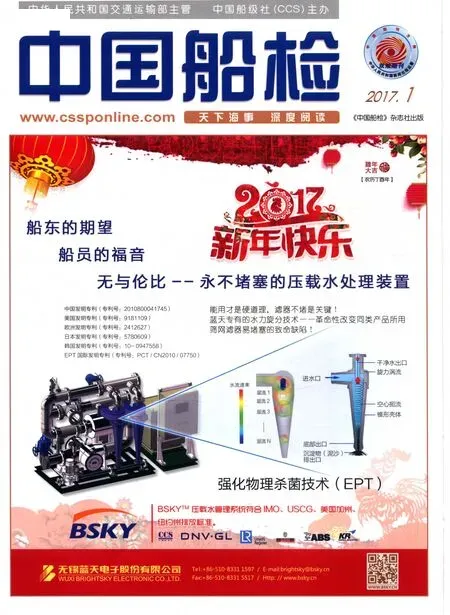Cold High Current Never Went Away in 2016
Reporter Xu Miaomiao
Cold High Current Never Went Away in 2016
Reporter Xu Miaomiao
The BDI index has fallen to its lowest level to 290 points since February 10, 2016, it seemed that the shipping industry has“taken breath”during the continuous rises afterwards. However, this kind of reversal did not last long, BDI index appeared to fall again after the rebound to more than 1000 points in mid-November, the false prosperity of BDI index has made the market excited. Compared with 2015, the shipbuilding market has been more bleak in 2016, Clarkson statistics show that from January to October of 2016, the global shipbuilding orders hit a new low record of 359 ships, a total of 24.8m dwt, plunged by 73% compared with the same period in 2015.
Some people say that “Internet + Shipping” is the direction, the future and means more opportunities, while others are full of panic about the challenges. The core purpose of Industry 4.0 is to promote intelligence level of industrial manufacturing and to specify the development direction of “personalized” shipping in the future. China and Germany are both powerful manufacturing countries, and have both respectively proposed industrial strategies, “Made in China 2025” and“Industry 4.0”, and have been continuously strengthening the cooperation in the feld of intelligent manufacturing.
In 2016, the integration and alliance among shipping enterprise have intensified. Liner industry stepped into the era of “beast” through five “wedding” games. In the International Maritime Annual Conference 2016, Mr. Mario Cordero, the Chairman of the United States federal maritime commission (FMC), proposed the second generation of the alliance concept. The four universal characteristics sought are: ship sharing, operations center, information sharing and joint procurement. To realize the closer connections among container enterprises in thefuture has become the basic direction and demand of the shipping companies.
The global shipping industry has entered a long adjustment period, against the background of rapid development of economy and trade in Asia, the international shipping resources further agglomerate to Asia, especially to China, China's infuence has been further improved, the Chinese factor, Chinese wisdom, Asian power have become powerful warm current to motivate the international maritime industry to cope with cold winter and to persevere forward.
On July 1, 2016, China Classification Society (CCS) offcially took over the Chairmanship of the International Association of Classification Society (IACS), initiating one year’s tenure as Chairman. At the beginning of the tenure, Sun Licheng, the President of CCS set clear action plan for the Chairman’s work. He said he would be committed to promote the active development of IACS, to meet the challenges faced. IACS will promote a number of key works next year, including being committed to the next phase of GBS work in IMO, deepening the application research of cyber system, and promoting a new generation of new technology application for surveys, so as to further play the role of technology leader, and strengthen the friendly relations and cooperation between IACS and IMO, IACS and the maritime industry, optimize the IACS organization and work flow, continue to improve members' quality performance. The following few months saw a full and busy schedule of Dr.Sun, hosting a series of meetings of IACS council, hosting a meeting between the IACS council members and the European commission relevant offcials, hosting the meetings between the IACS council members and senior representatives of the international maritime industry organizations; attending a series of meetings such as forums and conferences, proposing ideas, opinions and putting forward proposals;enhancing the influence and contribution of IACS, carrying out a series of communication and visits, strengthening the cooperation between IACS and related industry and institutions.
Under the survival crisis of the global shipbuilding industry, intelligent manufacturing has been raised to the strategic height by the world’s leading shipbuilding powers. The “South Korea shipbuilding industry competitiveness strengthening scheme” issued lately by South Korea shipbuilding industry clearly states that core technology development of the intelligent ship should be supported. It has also been identified by Japan as “production revolution” of traditional manufacturing industries. “Made in China 2025” proposes intelligence and green should be a main direction of the future development of China’s shipbuilding industry. In April 2016, the Ministry of Industry and Information Technology of China issued the implementation plan of intelligent manufacturing pilot demonstration 2016 special action, which clearly states that shipbuilding industry should continue to carry out the intelligent reconstruction of the key enterprises on the key links, production line, workshop, factory, to promote digital design, intelligent equipment upgrade, technological process optimization, lean production, visual management, quality control and trace, intelligent logistics and other pilot applications, to promote whole intelligent business process integration of enterprise, to cultivate a batch of system solution providers, and to form and promote intelligent standard and pattern. Chinese shipyards will gradually realize information and digital design and building, and grasp the core technology of intelligent shipbuilding.

